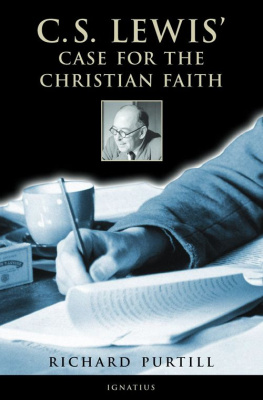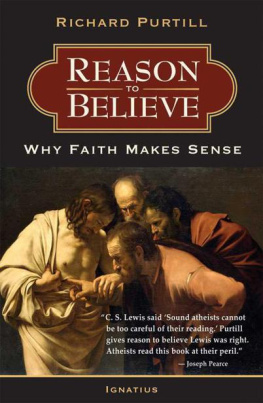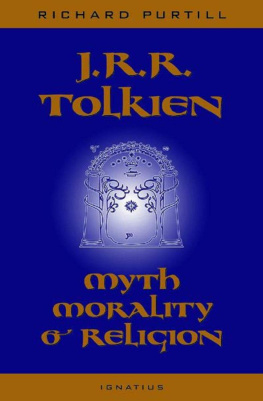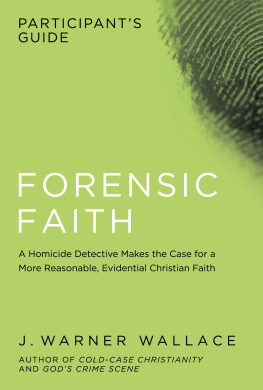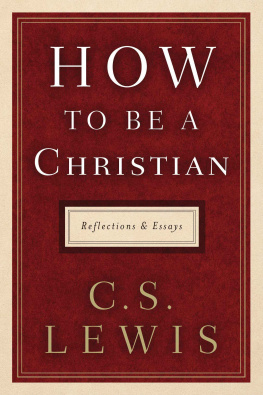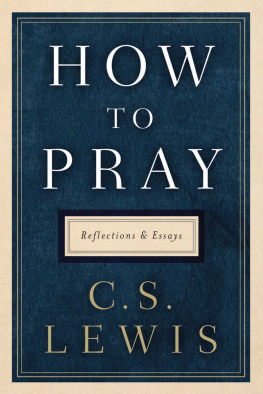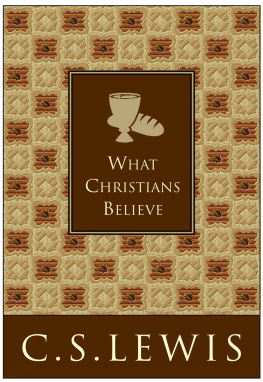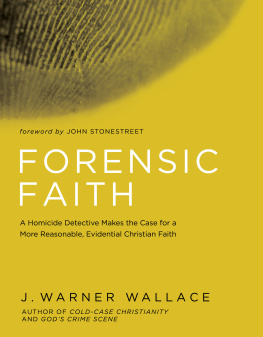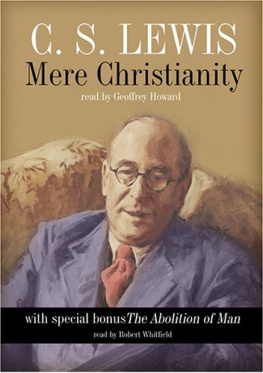Richard L. Purtill - C.S. Lewis case for the Christian faith
Here you can read online Richard L. Purtill - C.S. Lewis case for the Christian faith full text of the book (entire story) in english for free. Download pdf and epub, get meaning, cover and reviews about this ebook. year: 2004, genre: Religion. Description of the work, (preface) as well as reviews are available. Best literature library LitArk.com created for fans of good reading and offers a wide selection of genres:
Romance novel
Science fiction
Adventure
Detective
Science
History
Home and family
Prose
Art
Politics
Computer
Non-fiction
Religion
Business
Children
Humor
Choose a favorite category and find really read worthwhile books. Enjoy immersion in the world of imagination, feel the emotions of the characters or learn something new for yourself, make an fascinating discovery.
- Book:C.S. Lewis case for the Christian faith
- Author:
- Genre:
- Year:2004
- Rating:4 / 5
- Favourites:Add to favourites
- Your mark:
- 80
- 1
- 2
- 3
- 4
- 5
C.S. Lewis case for the Christian faith: summary, description and annotation
We offer to read an annotation, description, summary or preface (depends on what the author of the book "C.S. Lewis case for the Christian faith" wrote himself). If you haven't found the necessary information about the book — write in the comments, we will try to find it.
C.S. Lewis case for the Christian faith — read online for free the complete book (whole text) full work
Below is the text of the book, divided by pages. System saving the place of the last page read, allows you to conveniently read the book "C.S. Lewis case for the Christian faith" online for free, without having to search again every time where you left off. Put a bookmark, and you can go to the page where you finished reading at any time.
Font size:
Interval:
Bookmark:
C. S. LEWIS CASE FOR THE CHRISTIAN FAITH
RICHARD L. PURTILL
CASE FOR THE
CHRISTIAN
FAITH
IGNATIUS PRESS SAN FRANCICSO
Original edition published in 1981 and 1985 by Harper & Row
1981, 2004, Richard L. Purtill
New edition printed by permission
Cover photograph:
C. S. Lewis in his study at the Kilns (details)
1960
Marion E. Wade Center
Wheaton College, Wheaton, Illinois
Cover design by Roxanne Mei Lum
Published in 2004 by
Ignatius Press, San Francisco
All rights reserved
ISBN 978-0-89870-947-6 (PB)
ISBN 978-1-68149-063-2 (E)
Library of Congress Control Number 2003115827
Printed in the United States of America
This book is dedicated to
my wife, Betty,
for her support,
encouragement,
and love
CONTENTS
PREFACE
This book aims to present, in a clear and understandable form, the main lines of C. S. Lewis defense of and arguments for Christian belief and practice. Those who have read some of Lewis writing will find familiar ideas, but perhaps also some new ones. Thoseand there are manywho have read all of Lewis writings will, I hope, find that this compendium of Lewis thinking on many topics will help them to see him as a whole.
Some who read this book may be entirely unfamiliar with Lewis or, for that matter, with Christianity; I hope that this book will make them want to know more about both. As most of my readers will probably have read at least some of Lewis more popular works, where possible I have avoided the best-known works when quoting and made use of material from unpublished letters and from some of his lesser known works. While I have tried to resist the temptation to quote extensively from Lewis, he has often put a point so succinctly or so beautifully that it seemed better to quote than to substitute my poorer paraphrase.
My own qualifications are, first, a love of Lewis and a familiarity with almost everything written by and about him. I have read all of Lewis published writing, some of it many times. I have read most of the books written about Lewis in English and many of the important articles. But I think that, when trying to understand a writer, ones love for that writer is fully as important as any information one might have about that writer. Understanding is a result of appreciation: hostile critics almost always more or less misread the subject of their criticism.
I am by profession a teacher and writer, an Emeritus professor of philosophy at a state university, and the author of twenty previous books, including five fantasy novels, a number of textbooks, and a study of the fiction of Lewis and his friend J.R.R. Tolkien. I have written four books on logic and two on philosophy of religion, which gives me some qualifications for examining the strength of Lewis arguments for Christianity. My attempts at fiction give me some grounds for appreciating Lewis achievements in that field and the way in which he uses fiction to illuminate the ideas discussed in his nonfiction writing.
Since I agree with Lewis on most of the matters that this book deals with, some readers may find me too partial to be a good expositor of his views, preferring someone who would find more failures and faults. I must, somewhat ironically, apologize for disappointing them: I report what I find, and I find both Lewis and his case for the Christian faith worthy of respect.
The judicial metaphor of a case for the Christian faith is suggested by the title of one of Lewis own books. This is the case for one side of a disputed issue. Lewis would have been, and I would be, interested in an equally detailed exposition of the other side: the case against C. S. Lewis case for the Christian faith. But a philosopher is not an advocate; he must consider all of the evidence and follow the argument where it leads. If someone does not like the place where the argument has led Lewis, and myself, that person must give reasons to show that the argument should lead us elsewhere. I do not think this attempt will succeed, but I am willing to rest my case with this book and wait for the arguments on the other side.
My very special thanks to the trustees of the estate of C. S. Lewis, and especially to Walter Hooper, for permission to quote from fifteen previously unpublished letters written by Lewis. Originals of previously unpublished letters are in the Marion F. Wade Collection at Wheaton College, Wheaton, Illinois. I wish to express my appreciation to Dr. Clyde Kilby and the staff of the Marion E. Wade Collection for access to this fine collection of unpublished material by Lewis and for their help in making use of the material.
I also wish to thank Gord Wilson for his help in preparing this book for publication.
Some Reasons for Lewis Success
C. S. Lewis died in 1963, but his books continue to sell in the millions and to have an important influence on their readers. In the 1970s, Time magazines Religion section proclaimed, C. S. Lewis goes marching on. Books by other Christian writers also sell in large numbers, but these are often books of exhortation or inspiration, addressed to those already enthusiastic about Christianity. Lewis seems to have the power to reach out to those who are sceptical or wavering, and a large number of people from very different backgrounds have given Lewis a major share of the credit for their becoming or remaining Christians.
What accounts for Lewis extraordinary success? Those who share Lewis beliefs might say that it was the truth of the lessons he had to teach or the power of the Holy Spirit, but this does not explain why Lewis has been more successful than others who have taught the same lessons and invoked the same Spirit. Lewis himself was quick to say that he was only the conductor through which the message passed and that anyone or anything can be used as a conductor by the Holy Spirit. But something about Lewis made him an extraordinarily effective conductor of the message he transmitted: Christianity as presented by Lewis seems to reach people in a way that Christianity as presented by other modern writers does not.
The explanation for Lewis success is to be found in all the aspects of Lewis as a man and a writer, in his imaginative and moral qualities as well as his intellectual capacities. We will begin with his intellectual abilities. The first of these is his singular clarity, his ability to present a message so that it is comprehensible to anyone willing and able to make some intellectual effort. This was partially due to a natural talent for finding the right words for his thoughts, which more laborious writers may well envy; but it was also the result of a deliberate avoidance of jargon, an effort to speak in a way that would be understandable to the audience he was trying to reach.
When Lewis was invited to address a group of Christian teachers on how to communicate with their audience, he told them:
We must learn the language of our audience. And let me say at the outset that it is no use at all laying down a priori what the plain man does or does not understand. You have to find out by experience.... You must translate every bit of your Theology into the vernacular. This is very troublesome... but it is essential. It is also of the greatest service to your own thought. I have come to the conclusion that if you cannot translate your thoughts into uneducated language, then your thoughts are confused. Power to translate is the test of having really understood your own meaning.When he was rebuked by a scholarly theologian for using language that oversimplified the doctrines he was trying to explain, Lewis replied with gentle irony:
When I began, Christianity came before the great mass of my unbelieving countrymen either in the highly emotional form offered by revivalists or in the unintelligible language of highly cultured clergymen. Most men were reached by neither. My task was therefore simply that of a translator one turning Christian doctrine... into the vernacular, into language that unscholarly people would attend to and could understand.... My manner may have been defective. Others may do better hereafter. I am ready, if I am young enough, to learn.... [A] more helpful critic [would] advise a cure as well as asserting many diseases. How does he himself do such work? What methods, and with what success, does he employ when he is trying to convert the great mass of storekeepers, lawyers, realtors, morticians, policemen and artisans, who surround him in his own city?One thing at least is sure. If the real theologians had tackled this laborious work of translation about a hundred years ago, when they began to lose touch with the people (for whom Christ died) there would be no place for me.Next pageFont size:
Interval:
Bookmark:
Similar books «C.S. Lewis case for the Christian faith»
Look at similar books to C.S. Lewis case for the Christian faith. We have selected literature similar in name and meaning in the hope of providing readers with more options to find new, interesting, not yet read works.
Discussion, reviews of the book C.S. Lewis case for the Christian faith and just readers' own opinions. Leave your comments, write what you think about the work, its meaning or the main characters. Specify what exactly you liked and what you didn't like, and why you think so.

